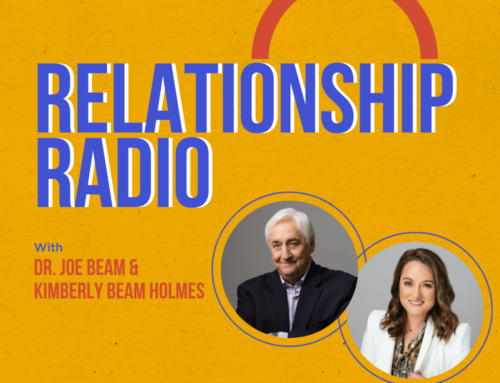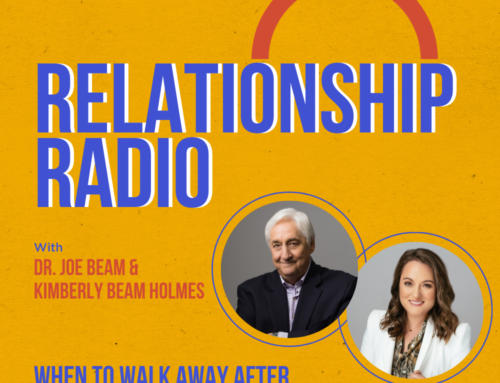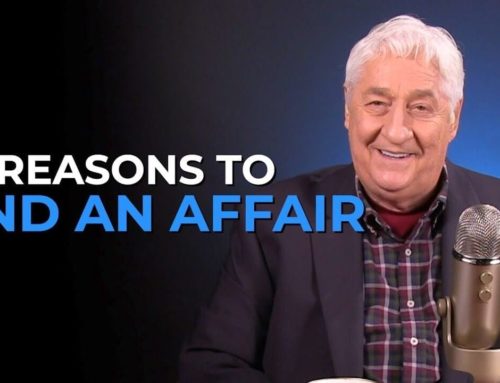Dr. Joe Beam: I think that sometimes, all of us, want things to happen a lot faster than they will happen. For example, when this person says, “okay, well, I want my husband to listen to me.” I get that, and in any good relationship, we really want that to occur. But then she goes ahead and gives us the information that he’s still angry and he’s still upset. Well, the first step then, is not, believe it or not, to get him to listen to you. I know you want that. We understand that. And that certainly should come at some point, but that’s not step one. Step one is to help him deal with his anger, the fact that he’s upset with you.
Now, how do you do that? Understand that anger is always based on pain. When you see somebody angry, it’s because they are hurting about something. Now, obviously, when we have a written question, there’s no way to know what kind of pain he’s dealing with. I mean, is it the pain of something that you did that hurt him deeply? Is it the pain of the fact that maybe he was involved with somebody else? He’s ended that, trying to put the marriage back together, but still grieving, or mourning, that relationship that he gave up to come back to the marriage.
In other words, I don’t know what pain you’re talking about. But, I do know this. If he’s still upset and he’s still angry, then there’s pain there. Now, if the pain is toward you, in other words, something that you have done, like maybe you had the affair or you gambled away all your money. I mean, I’m making up things here because I don’t know the story, then the first thing is to make sure that you have stopped whatever it is that caused the pain. Don’t do that anymore.
So, for example, if you were controlling or dominating and he just had it up to here and can’t take it anymore, then you’ve got to stop doing that. So, step one is, whatever you have done, if anything, has to stop. Number two, you demonstrate that. It doesn’t help just to tell him. I’m not doing that anymore. It’s okay to tell him, but it doesn’t prove anything. You have to demonstrate it by the way you live. Then, you have to really try to understand. That means you need to listen. Now, if he’s angry and upset, he may not be talking or he may be talking a whole lot.
Either way, you try to understand and if he does talk, don’t defend yourself. Don’t try to justify, don’t try to explain. Just as best you can, try to understand what he feels. Now, validate his feelings, but don’t validate anything he says about you that isn’t true. For example, don’t accept blame for things you didn’t really do, because that doesn’t help anything. But you can say things such as, I can see how you feel that way. I think I would see it that way as well. Visualize getting on his side of the table, where that, rather than being across the table and then the antagonist, you’re right beside him. You’re the partner who’s listening and trying to understand and as time helps that anger subside, and the relationship gets closer to normal, that’s when you can start expressing your needs; “Honey, this is something I need from you”, but that’s really premature right now. If he’s angry, deal with that first.
Kimberly: That’s so good, because a lot of times when we’re in situations like this, when we’re the spouse who is wanting our marriage to get back to normal as quick as possible, we want it to change overnight.
Dr. Joe Beam: Yeah, and that’s human nature.
Kimberly: It is human nature, and so, there’s nothing, right now, that you can do or say that’s going to change his anger overnight. This is a process and so, what Dr. Beam, may I call you Joe?
Dr. Joe Beam: Yes. Please call me, Joe.
Kimberly: I get that privilege. So, what Joe is saying here is, first you really have to just take a step back, look at the situation, start listening to him.
It always, always, I’m going to say always, you might disagree with that, always behooves us to want to listen more than we want to talk. Listening to our spouse. What they’re wanting, what their needs are. What they’re going through, as opposed to wanting them to listen to us.
Dr. Joe Beam: That should be the goal, and over time, hopefully that becomes fairly even.
Kimberly: Yes.
Dr. Joe Beam: Over time.
Kimberly: Right.
Dr. Joe Beam: But, if he’s upset and angry, it’s going to be more you listening at this point.
Kimberly: Right. Absolutely.





